Ex-Navy Diver Claims He Made Himself 20 Years Older After Spending a Record 100 Days Underwater
A Florida scientist who spent 100 days underwater claims he is still getting some of the health benefits nine months after returning to land.
Retired Navy diver Joseph Dituri spent this record-breaking time in a bunker 30 feet below the surface of the Atlantic Ocean, in a high-pressure environment that he says reversed the age of his body at the cellular level.
When Dituri emerged last June, he claimed blood tests showed a 50 percent reduction in every inflammatory marker in his body, 17 times the number of stem cells he had before the stint, and longer telomeres – structures on chromosomes that have a theoretical link to prolonging life.
Joseph Dituri spent 100 days underwater in 2023, breaking the previous world record of 73 days. He claimed that his blood showed signs of reverse aging when he resurfaced
“I am now 56. My extrinsic (biological) age was 44. When I came out of the water, my extrinsic age was 34,” Dituri told reporters at WKMG News in Orlando. ‘So my telomeres got longer. I actually got younger when I was underwater.”
At the end of your chromosomes are telomeres, which resemble the plastic dots at the ends of shoelaces.
Each time your cells divide, the telomeres shorten. Once they are gone, the chromosome unravels and the cell dies. So the idea is that if you keep them for a long time, the cells will live longer, slowing down the overall aging process.
This idea of longevity has not yet been proven in human experiments, but other researchers are working on gene therapies to lengthen telomeres in hopes of slowing the aging process.
Dituri claimed that his telomeres are not as long as when he first came out, but they are still longer than before.
He also reported that his cognition improved during his time underwater.
Dituri believes his age change was caused by living in a high-pressure or ‘hyperbaric’ environment.
In modern medicine, a hyperbaric chamber usually contains pure oxygen, but in the case of submarine pressure the mixture is closer to that of ordinary air.
The health benefits of hyperbaric chambers have been well documented since a British doctor built the first one in 1662 – more than 100 years before the discovery of oxygen.
In many cases, however, proponents of the healing effects of hyperbaric therapies have relied more on anecdotal evidence than on high-quality clinical studies.
Nevertheless, the medical literature shows that some people have experienced profound, almost miraculous benefits from hyperbaric therapy.
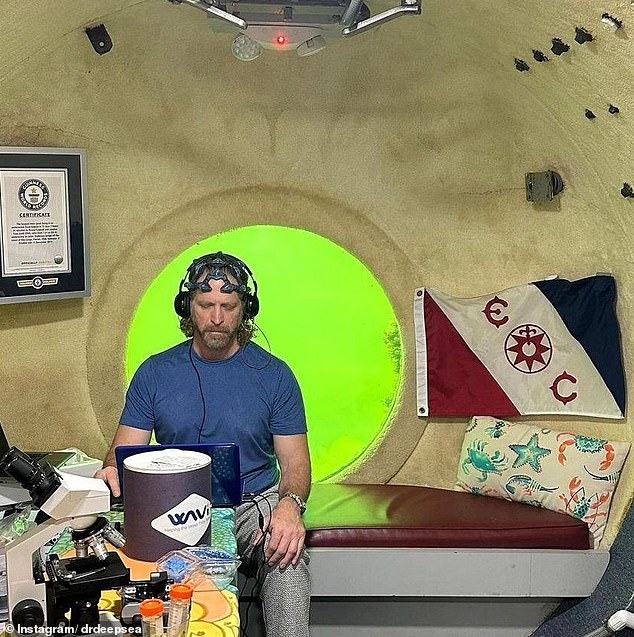
In his underwater pod, Dituri took many measurements about his physical health, including encephalography (EEG) recordings.
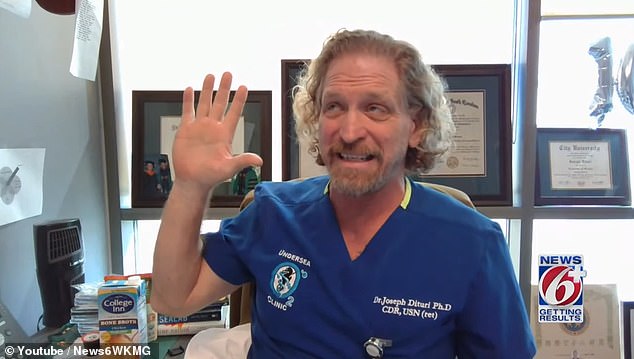
In an interview with an Orlando news station this week, Dituri said he still shows signs of anti-aging in his cells
Doctors treated patients suffering from the 1918 Spanish flu with hyperbaric therapy, bringing them back from the brink of death by putting them in chambers filled with compressed air.
“I mean come on! This has come full circle. So why not treat post-COVID (complications),” Dituri said.
He added that scientific studies need to be conducted, but the anecdotal evidence should be enough evidence that there is something worth investigating.
Specifically, he said, scientists should investigate the “mechanisms of action” — what happens at the molecular level that leads to health effects.
One he points out is ulcerative colitis, a chronic intestinal disease linked to inflammation.
“These are the kinds of things we need to investigate,” he said.
Although further research is needed, hyperbaric therapy has been associated with improved wound healing and reduced inflammatory markers since its inception.
Recent research even showed that hyperbaric oxygen therapy can reduce the rate at which blood cells die and even lengthen telomeres.
Inflammatory molecules have been linked to autoimmune diseases such as Crohn’s disease and ulcerative colitis, and even COVID for a long time.
Reduced inflammatory markers are linked to a lower risk of cancer, improved cognitive function and a reduced risk of heart disease.
Dituri also had 17 times as many stem cells on him as before his time underwater, he claimed.
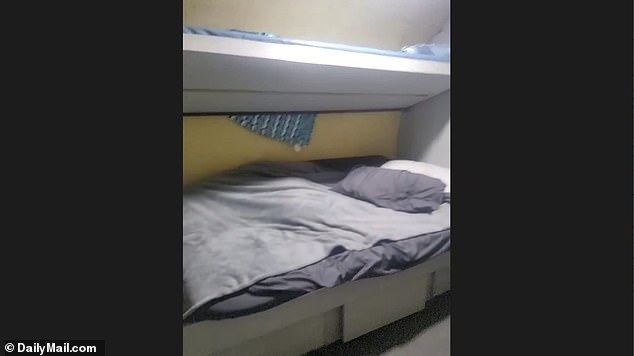
Dituri spent his time in a 30 square meter pod, where his REM sleep improved significantly from his baseline
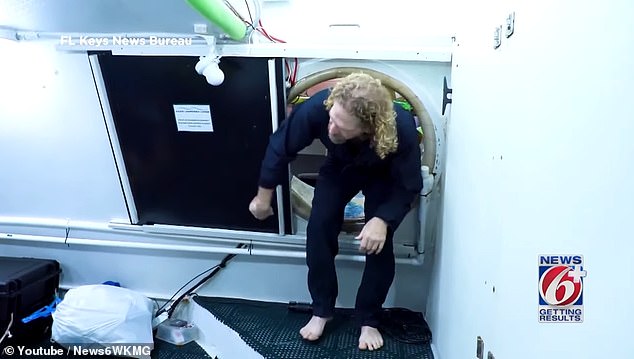
When Dituri emerged, he was reportedly a quarter of an inch shorter than when he went in
Stem cells can develop into any other cell type in the body and are therefore associated with regenerative medicine.
The effects of Dituri were observed after 100 days of 24-hour exposure to a hyperbaric environment.
Hyperbaric oxygen therapy, on the other hand, is usually performed in one-hour increments over the course of a few days to a few months.
Nevertheless, most studies showing health effects were conducted under those conditions, so you shouldn’t have to lock yourself under the ocean to reap the anti-aging benefits.
Dituri also said: ‘We have seen great results with long-term COVID-19 – just 10 treatments.’
However, it can be expensive. Dituri said each one-hour treatment should cost about $250, but he suggested some providers may charge much more.
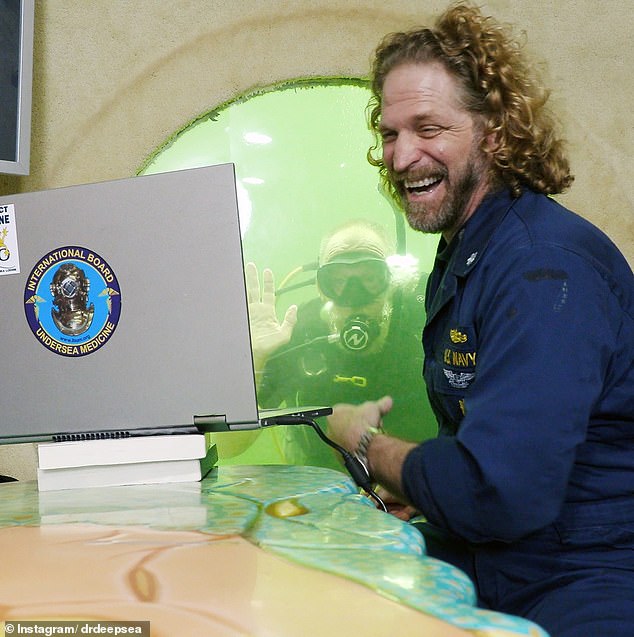
Dituri notes that more studies are needed to prove the purported anti-aging effects of hyperbaric therapy
Dituri insists he has no financial conflicts of interest, but he does make a living by training doctors in hyperbaric medicine. Submarine Oxygen Academy.
However, the effects were not all positive.
“I shrunk by a quarter of an inch, I had some significant problems, I broke a tooth while I was down there,” Dituri told reporters.
Compared to astronauts who find themselves in weightlessness and tend to grow an inch or more in size during long journeys, Dituri lived under enormous pressure.
“When you go underwater you increase the pressure – in my case I almost doubled it,” he said.
However, Dituri isn’t too concerned about losing height.
“I have what I have, and these are the cards I have been dealt,” he told reporters after they urged him to be disappointed because he was only 6 feet tall.
Dituri also maintains other trendy health practices, besides living in a submarine capsule.
During the interview, he told reporters that he fasted most of the day and lived on water and bone broth until about 3 p.m.
So hyperbaric therapy may not be the only treatment that has helped him slow or reverse his aging process.
And while Dituri makes some miraculous claims about hyperbaric therapy, he approaches it with cautious optimism.
“The science isn’t ready yet, but we’re working on it,” he said. “There are a lot of things it can’t cure, but there are some good uses for it.”
